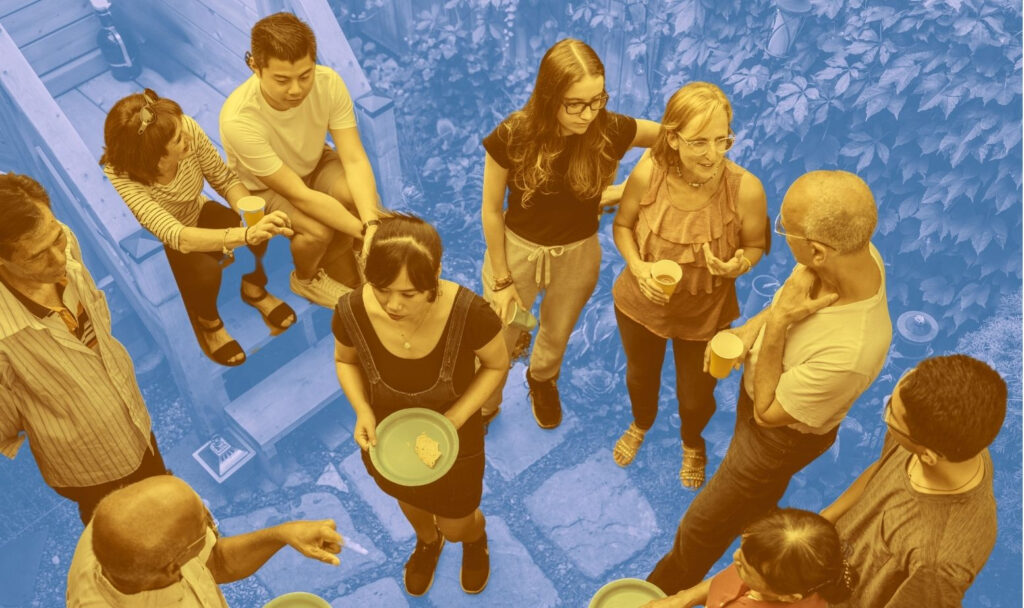‘The Spirit of the Lord is on me, because he has anointed me to proclaim good news to the poor. He has sent me to proclaim freedom for the prisoners and recovery of sight for the blind,to set the oppressed free, to proclaim the year of the Lord’s favor’ (Luke 4:18-19, NIV).
When Jesus read these words from the scroll of prophet Isaiah, he followed it up with an assurance that it had been fulfilled that very day. The implications for those listening to him were enormous. It meant the fulfillment of a much-awaited hope for God’s deliverance from a whole swath of difficulties and suffering. It sure was the ‘good news’ awaited by those living in poverty, in injustice, in sickness, in domination, and in the futility of the social system put in place under the colonial rule of the Roman Empire.

A Community of Jubilee
The catchphrase that so often gets lost in translation in Luke 4:18-19 is ‘the year of the Lord’s favor.’ Jesus said he is proclaiming that the long wait for this moment is over. But what does it mean? What ‘year of favor’ is being referred to here? The people around Jesus at that time knew well that it is a shorthand for the Year of Jubilee. Spelled out in Leviticus 25, this year marked the grand reboot that was meant to undo the misfortunes, dysfunctions, and injustice that had taken root among the people of ancient Israel.[1]
for the pioneer community of Jesus-people, love was not a matter of strategy but the very cost of being disciples
Yet to people living in the time of Jesus, the question running in their minds must have been ‘What exactly has changed’? A question that even John the Baptist pondered as he was isolated in jail by King Herod. To this Jesus sent an answer: ‘Go back and report to John what you hear and see: The blind receive sight, the lame walk, those who have leprosy are cleansed, the deaf hear, the dead are raised, and the good news is proclaimed to the poor. Blessed is anyone who does not stumble on account of me’ (Matt 11:5-6, NIV). Again, Jesus emphasized that in him and in his coming, Isaiah’s prophecy was finally coming true. Something powerful and remarkable was unfolding in the world. Those without value in society were given worth, the outcasts were welcomed in, and the powerless and neglected were paid attention. Hope was rising and it was surely coming to all as it reached even those at the margins.
It is important to keep this in mind as we follow Luke’s accounting of the events that transpired after Jesus’ resurrection. In the book of Acts, the community formed around the messiah named Jesus displays the same characteristics as identified by the prophet Isaiah. What astonished the apostles and the followers of this Jesus was how he commissioned them to be ‘witnesses’ of what he had begun to do and the power granted to them which accompanied this mandate (Acts 1:8). Following the Pentecost story, we read of the ‘collective witness’ of a faith community marked by lives that anticipated the proper order of God’s kingdom. Very quickly, Jubilee’s outworking translated itself into a ‘togetherness’ (koinonia) in doctrine, prayer, liturgy, and a looking after the welfare of ‘one another’ (allelous) so radical that ‘no needy people were found among them’ (Acts 2:42-47, cf. Acts 4:32-37).[2] Anyone familiar with the Torah, at that time, would surely remember Yahweh’s vision and admonition in Deuteronomy 15:1-11 to ensure that among God’s people, the needy would be taken care of. They even dedicated a set of people who would be responsible in this work of compassionate service so that the apostles could focus on their fervent ministry of teaching (Acts 6:1-6).
Luke tells us that this kind of ‘community life’ gained not only the favor of other people but also a regular addition of those who likewise wanted to take part in this strange sort of ‘togetherness.’ The immediate impact was unmistakable: ‘So the word of God spread. The number of disciples in Jerusalem increased rapidly, and a large number of priests became obedient to the faith.’ (Acts 6:7) One may ask how even teachers of the law themselves, the likes of Nicodemus, weighed in favor of a newfound community. Was there a hidden strategy at work? Were they trying to be relevant? Or intentionally attracting attention to themselves? No, they were instead simply being faithful to follow the example of the messiah who gave them a vision of a new way to live (John 13:15-17).[3]
‘Love your neighbors…’
‘Love your enemies…’
‘Love one another as I have loved you…’
‘Let your light shine before others…’
At the very least, it has to be said that for the pioneer community of Jesus-people, love was not a matter of strategy but the very cost of being disciples of a man who ‘came not to be served, but to serve, and to give his life as a ransom for many’ (Mark 10:45).

A Sent-out Community
Very quickly, just after a few chapters in the book of Acts, Luke also tells us that the positive reception that the community of disciples enjoyed turned into persecution. An eventual clash with the leaders of the Jewish religion ensued. True to form, martyrdom served as the path for those who proclaimed the Good News as Jesus did (Acts 7). Consequently, the gathered community in Jerusalem was scattered in neighboring areas, exactly as Jesus previously planned for their witness to spread—from Jerusalem, to Judea, to Samaria, and the ends of the earth (Acts 1:8). Accordingly, they ‘preached the word wherever they went’ (Acts 8:4) and in the case of the Samaritan city, the Good News brought a ‘great joy’ (v. 8), reminiscent of the controversial encounter between Jesus and the Samaritan woman (John 4:1-42).
It can be said that the deadly persecution ‘sent them out’ (missio in Latin), thus saving the life of the Jubilee community. This scattering led to the further breaking down of social barriers as the Good News crossed the realm of Jewish nationality, faith, and culture to the diverse people, regions, and religions of the Roman Empire. In the process, the first glimpse of Jubilee was spared from being an idyllic portrait limited to the imaginations of the Jewish people. When the scattered believers traveled as far as Phoenicia, Cyprus, and Cyrene, they were confronted with a new reality brought forth by God’s kingdom breaking-in. Apostle Peter’s realization was forceful: ‘So if God gave them the same gift he gave us who believed in the Lord Jesus Christ, who was I to think that I could stand in God’s way?’ (Acts 11:17)
The promise of Jubilee is to be a lived reality for the rest of humanity! Yes, but it will take form in distinct and peculiar ways.
Guided by the Spirit of God, the apostles and leaders came to a realization that their faith community was not to be domesticated and would have to transcend the boundaries of Jewish religion.[4] An early cue is that it was in Antioch, not Jerusalem, and among the non-Jewish followers of Jesus Christ, where they gained a recognizable name for their faith community—one that is in use up to this very day—’Christians’ (Acts 11:25). A very interesting twist followed in what could be regarded as the first missiological council—the resolution that it would do well for the cause of the Good News to set the non-Jewish followers of Jesus free from the trapping of Jewish wineskins (Acts 15:1-31). From here on, it would be up to these new members of the ‘Jesus community’ to figure out the very serious implications of being a ‘Christian community’ living within the contexts, cultures, and life issues of Corinth, Thessalonica, Ephesus, among the other cities of the Greco-Roman world.[5] A good example is the clash of political allegiance that devoted citizens of Rome saw as being inevitable among Christians: ‘They are all defying Caesar’s decrees, saying that there is another king, one called Jesus’ (Acts 17:7).
Much of the burden of unraveling the implication of the Good News taking root in fresh contexts and different communities would be borne by Apostle Paul. Carlos René Padilla, a theologian from Ecuador, put it well when he said that this task was ‘directed to making disciples in whose lifestyle the example of Jesus would be reproduced: an example of unconditional love for God and neighbor, of humble service and solidarity with the poor, of commitment to the truth and unshakeable opposition to all forms of hypocrisy.’[6] Regarded as the Apostle to the Gentiles, Paul’s numerous epistles, a number of them ‘sent-out’ from prison, are a testament to the enormous challenge of ‘making disciples of all peoples’ (Matt 28:19-20). A Great Commission indeed!
At the closing of the book of Acts, we find Apostle Paul detained in Rome but willfully steadfast in ‘sending-out’ the news about God’s kingdom coming (Acts 28:30-31).

A Sustained Community
It has to be noted that for the next hundreds of years, the Roman world saw a sustained wave of ‘witnesses’ that continued to bear not only a testimony of faith but also concrete evidence of the reality of God’s kingdom in their midst.[7] A powerful reality animated by the vision of Jubilee saw diverse sorts of people within a shared community of faith transcending the selfishness, insecurity, and fear that root deep in the human heart. As they were taught to pray for God’s kingdom to come and for God’s will to be done ‘on earth as it is in heaven’ (Matt 6:10), they made sure that they themselves would form part of the answer to this petition.
A powerful reality animated by the vision of Jubilee saw diverse sorts of people within a shared community of faith transcending the selfishness, insecurity, and fear that root deep in the human heart.
What happened to the ancient church that picked up the story where the book of Acts left off? The records of history are nothing short of steadfast about their commitment to live by the discipleship of Jesus:
‘The type of care—revolutionary in comparison with pagan society—extended in principle to all members of the community in need of help shows that the use of ‘brother’ and ‘sister’ in Christian communities was not mere affectation. Care was extended above all to widows, orphans, the elderly and sick, those incapable of working and the unemployed, prisoners and exiles, Christians on a journey and all the other members of the church who had fallen into special need. Care was also taken that the poor received a decent burial.
The care of the Christian communities for their unemployed and for those unable to work is worth particular attention. They insisted that all who were able to work did so; they even arranged jobs for them, as much as they were able to. But anyone no longer able to work could be sure of receiving support from the community. They had a system of aiding employment and a network of social security which was unique in the ancient world.’[8]
No wonder that even a Roman Emperor himself was put to shame when this kind of love was extended beyond the confines of the Christian community. Said Emperor Julian (AD 361-363), ‘Christians feed not only their poor but ours also…Those who belong to us look in vain for the help that we should render them.’[9]
Conclusion
Holistic, integral, transformational, cruci-formed, missional—these words have been used today to describe this powerful collective witness. They re-capture or re-emphasize the breadth and depth of what it means to be part of Jesus’ revolutionary community, whose captivating story was first told in the pages of the book of Acts.
As Emperor Julian must have understood, when people are loved by the Christian community, it won’t be long before they are also embraced by the Christian message.
Endnotes
- To read more about the Jubilee and its formative influence in the life of the early followers of Jesus, see Ched Myers, The Biblical Vision of Sabbath Economics (Washington: Tell the World, 2008).
- John Stott noted two aspects of koinonia as it is used in the book of Acts: what the believers ‘share in together’ and what they ‘share out’ together. ’Koinonia in the New Testament concerns not only what we possess but what we do together, not only our common inheritance but also our common service,’ he wrote. John Stott, One People (New Jersey: Revell,1986), 87.
- David Zac Niringiye remarked that the ‘growth’ experienced by the believers in the book of Acts runs contrast to much of today’s church growth theories and practices in the sense that the latter ‘lay a great emphasis on strategies and methods rather than the faithful life and witness of believers.’ David Zac Niringiye, The Church: God’s Pilgrim People (Carlisle: Langham, 2014), 133.
- Craig van Gelder suggests that the way to understand the missional calling of the church is to understand the ministry of the Spirit especially in the church’s formative stage and the quick instance of the need to keep with a continuous ‘forming’ (or reforming) as shown in the book of Acts. Craig Van Gelder, The Ministry of the Missional Church: A Community Led by the Spirit (Grand Rapids, MI: Baker Books, 2007), 24, 40.
- Melba Padilla Maggay’s perspective on the dynamics of Gospel and culture is worth citing here: ‘Christianity is a global religion that is at the same time incarnational…Being incarnational in witness means that we take seriously a culture’s themes and construct a culture-specific message that truly speaks to that culture…It is time to move away from a transnational model of mission to an incarnate one, with a gospel that is shaped autochthonously.’ Melba Maggay, Global Kingdom, Global People: Living Faithfully in a Multicultural World (Carlisle: Langham, 2017), 124-125.
- C. Rene Padilla and Tetsunao Yamamori, The Local Church, Agent of Transformation: An Ecclesiology for Integral Mission (Buenos Aires: Kairos Ediciones, 2004), 31.
- For a landmark and thorough study of the ‘shared life’ of the early Christian community in the second and third centuries (pre-Constantinian period), see Helen Rhee, Loving the Poor, Saving the Rich: Wealth, Poverty, and Early Christian Formation (Grand Rapids, MI: Baker Academic, 2012).
- Gerhard Lohfink, Jesus and Community: The Social Dimension of Christian Faith (Philadelphia: Fortress Press, 1984), 155.
- As quoted in Stephen Neil, A History of Christian Missions (New York: Penguin, 1964), 37-38.

